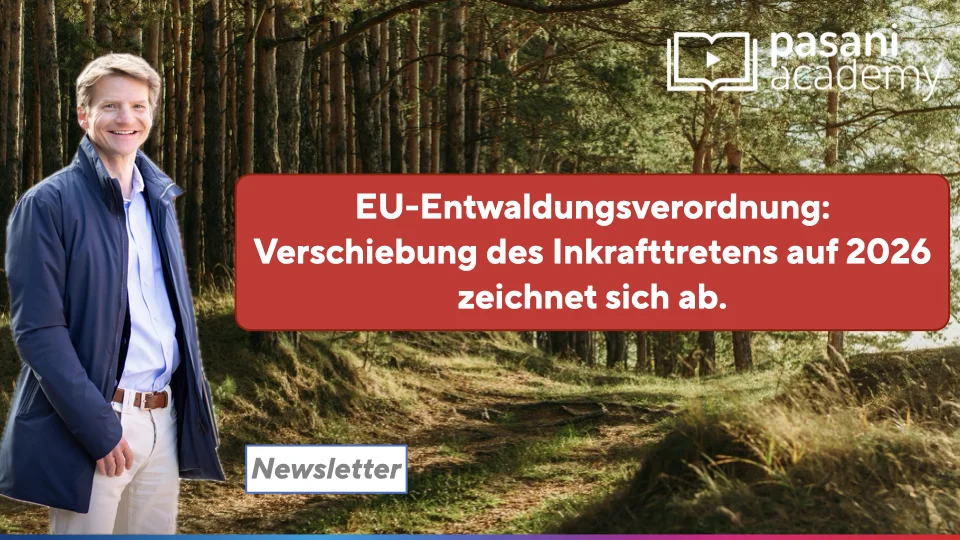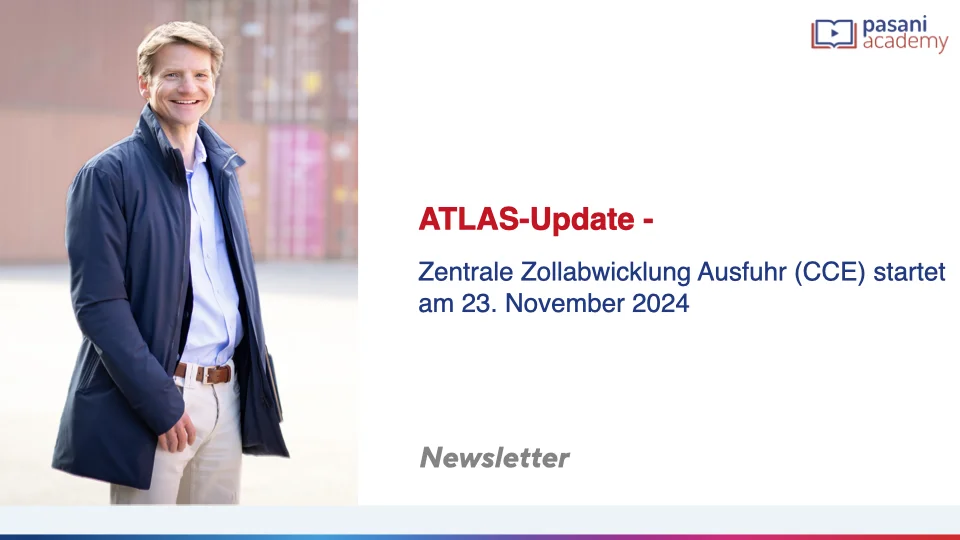News from customs and foreign trade

7. January 2025 ·
2 Min. Reading time
EU deforestation regulation: postponement of entry into force to 2026 looms.
The planned EU deforestation regulation, which is intended to prevent the import of products that contribute to deforestation, is to be postponed until 2026. This postponement, which affects many players in the affected sectors, offers companies the opportunity to take a closer look at the requirements and make the necessary adjustments.
The aim of the Deforestation Regulation is clear: the EU wants to ensure that imported goods such as soya, palm oil, coffee, wood, rubber, cocoa, beef and other products made from these raw materials do not originate from areas that have been destroyed by deforestation. These stricter requirements are intended to counteract the global destruction of forests and mitigate the negative consequences for the climate, biodiversity and local communities. The original plan was for the regulation to come into force in January 2025. However, due to complex discussions and numerous demands for adjustments, the European Union Parliament has now agreed to the postponement. The Council of Ministers of the European Union must now confirm the decision before it can finally enter into force.
This decision creates more time for the affected companies and trading partners to implement the necessary measures and harmonise their supply chains with the new requirements. Even though this may be a relief for many companies, the need for a changeover remains. Especially for companies operating in the food or raw materials sector, it is advisable to use the coming months to prepare intensively. The delay to 2026 should not be seen as a signal to wait and see, but as an opportunity to establish sustainable processes.
In addition to the postponement, there were also further discussions regarding the details of the regulation. There are signs of a trend towards a moderate softening, particularly with regard to traceability requirements and documentation obligations. Nevertheless, the core objectives of the regulation remain the same - to strengthen the protection of the world's forests and contribute to more sustainable production.
This means that companies need to ensure transparency in their supply chains and respond to the requirements of the regulation at an early stage. Training, workshops and close cooperation with suppliers will be important building blocks for successful implementation. Use the time until 2026 to optimise your strategic positioning and secure long-term competitive advantages.
Would you like to find out all the background information on the EU deforestation regulation and stay up to date on possible changes? With our annual customs update, you won't miss any relevant topics on customs, foreign trade and export controls.
Read more

7. January 2025 ·
3 Min. Reading time
ATLAS update: Central Customs Clearance Export (CCE) starts on 23 November 2024
The German customs administration has announced decisive innovations in ATLAS Info 0673/24 dated 12 November 2024: The introduction of Central Customs Clearance Export (CCE ) is imminent. From 23 November 2024, the procedure will be introduced in Germany with version ATLAS 10.1.2. Companies should prepare for the new processes in order to continue to organise their export processing efficiently.
What is Central Customs Clearance Export (CCE)?
CCE makes it possible to centralise export processes within the EU using electronic data exchange between customs administrations. This means that export declarations can be made at a central customs office of export, even if the customs office of presentation is located in another EU member state.
The procedure is based on closely networked, electronic communication between the customs authorities involved. This allows processes to be standardised and cooperation between the member states to be improved.
Requirements for participation
The use of the CCE requires the following points:
Technical requirements: The Member State in which the customs office of presentation is located must be able to exchange messages with Germany. Companies can view this information via future ATLAS info.
Updating the authorisations: Existing authorisations for Central Customs Clearance (CCL) must be coordinated with the countries involved.
For member states that do not fulfil the requirements, the previous procedure using a CCL authorisation remains in place.
How is the CCE implemented in Germany?
The implementation of the CCE in Germany is characterised by a high degree of automation. The most important processes at a glance:
Waiting times:Polylang placeholder do not modify
Automated release:Polylang placeholder do not modify
Checks and controls:Polylang placeholder do not modify
Changes to document requests
A key point in the new procedure concerns the submission of documents:
The customs office of presentation requests the necessary documents via the customs office of export.
However, companies are responsible for submitting these documents to the customs office of presentation independently.
The type of controls is differentiated using defined codes, which facilitates precise allocation. This ensures greater transparency and efficiency in the processes.
Retroactive export declarations: Introduction postponed
The option to make retroactive or subsequent export declarations using a CCL authorisation will not be available until 22 February 2025 with ATLAS 10.1.2, maintenance window 05. This delay was communicated in the current ATLAS info.
As soon as this function is activated, companies can subsequently declare export transactions, e.g. from an emergency procedure. It is important that the relevant evidence is submitted in good time in order to avoid delays.
What companies should do now
The introduction of CCE brings numerous advantages, but also requires internal processes to be adapted at an early stage. Companies should take the following measures:
Review of authorisations: Existing licences should be reviewed with regard to the new requirements and updated if necessary.
Employee training: All relevant departments should be informed about the changes and trained accordingly.
IT adaptations: The systems should be adapted to the requirements of the new ATLAS version in good time.
Conclusion
Central Customs Clearance Export (CCE) represents a significant step forward in the modernisation of customs processes. Companies that familiarise themselves with the new regulations at an early stage can benefit from the advantages of more efficient and automated customs clearance.
Stay informed - follow our future posts on this topic and adapt your processes accordingly to ensure a smooth transition.
Read more
11. December 2024 ·
1 Min. Reading time
Zelos – the new ATLAS application
The German customs administration has published a video explaining the new ATLAS application ZELOS. ZELOS, which stands for "centralised exchange of documents, requests and statements", is optionally available to participants from Atlas Release 9.0. From Atlas Release 10.1 and AES Release 3.0, ZELOS is mandatory for all participants.
You can find the link to the full video here.
Source:
zoll.de
Read more
11. December 2024 ·
1 Min. Reading time
Brexit: EU Commission publishes guidelines for companies
The EU Commission publishes a guide for companies to prepare for the end of the transition period.
You can find the guide here.
Source:
European Commission
Read more
11. December 2024 ·
1 Min. Reading time
The PASANI whitepaper and our comprehensive blog on BREXIT!
GET READY FOR BREXIT!
The PASANI Customs Academy's Brexit whitepaper provides you with valuable information on how to organise customs processes after Brexit.
In addition, our Brexit blog will provide you with the latest information on Brexit developments.
Click here and stay up to date!
https://www.pasani-academy.de/brexit/
Read more
11. December 2024 ·
1 Min. Reading time
ATLAS – IMPOST – Change especially in the eCommerce sector!
On 1 July this year, the so-called exemption limit for small consignments with a low value, which is 22 euros, will be abolished. Customs declarations must then also be submitted for such consignments on import. However, a customs declaration with reduced details is possible for these consignments. In order to map this in ATLAS, the so-called IMPOST procedure is implemented in ATLAS in Germany. This article explains how this works and what alternatives are available.
Read more
11. December 2024 ·
1 Min. Reading time
E-commerce – innovations in import processing. The customs administration provides information.
The Customs Administration provides information on its website about the upcoming changes to customs clearance for postal and courier consignments from 1 July 2021.
What will change?
The previous value limit of 22 euros will no longer apply from 1 July 2021, meaning that an electronic customs declaration must be submitted for every import consignment. Two different options are available for this:
For companies already participating in ATLAS, the new declaration type APK (declarations of postal and courier shipments with a value of up to 150 euros) will be created.
For private individuals, the IPK application (Internet declaration for postal and courier consignments with a value of up to 150 euros) will be created, which will be accessible via the citizen and business customer portal.
You can find the full article here.
Source:
zoll.de
Read more
11. December 2024 ·
1 Min. Reading time
ATLAS-Info: Extension of the REX transition phase for certain countries
The German customs administration informs in an ATLAS participant information that due to the Covid-19 pandemic, the transitional period for the application of the REX system will be extended until 31 December 2020 for some countries. The transition period actually expired on 30.06.2020.
The complete participant information is available here:
Source:
zoll.de
Read more
11. December 2024 ·
1 Min. Reading time
Implementation of the new EU Dual-Use Regulation in ATLAS
The entry into force of the new Dual-Use Regulation on 09.09.2021 brings with it some technical adjustments in ATLAS, which were implemented on 01.10.2021. New authorisation codes will be used in ATLAS Export. They replace the previous codes.
A table with a comparison, as well as the complete ATLAS information, can be found here!
Read more
11. December 2024 ·
1 Min. Reading time
ATLAS change
ATLAS Info 0232/21 (you can find the link here) informs you that new codes for the type of transaction will be used from 15 January 2022. Prepare for this in good time and implement the new transaction types in your IT. Please also note the information on the changeover date in the night from 14/01 to 15/01!
This ATLAS changeover is coming early so that companies can prepare for it. In the past, changes have sometimes been communicated by the authorities a few days in advance. Further information can be found at destatis.
Read more